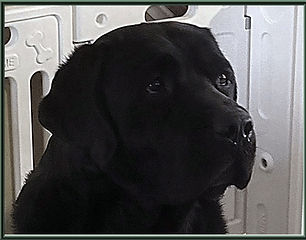

Meet Apollo . . .



CH. Brookhaven's to the Moon and Back
January 6, 2017
OFA CHIC 137365
OFA Hips - Good
OFA Elbows - Normal
OFA Patella Luxation - Normal
OFA Eyes - Normal (17)(18)(20)(21)(22)(23)(24)(25)
OFA Heart - Clear by Color Doppler
OFA Full Dentition & Scissor Bite
DNA Genetic Testing:
Any dog must carry two copies of these diseases in order to be affected.
Apollo does not carry any copies of the following diseases, meaning he can never suffer from these diseases and none of his first generation offspring can be affected by these diseases.
Apollo is clear/normal for:
Achromatopsia (Labrador Type)
Centronuclear Myopathy (CNM)
Chondrodystrophy with Intervertebral Disc Disease (CDDY with IVDD)
Chondrodysplasia (CDPA)
Cone-Rod Degegneration (Labrador Retriever Type)
Congenital Myasthenic Syndrome (Labrador Retriever Type)
Cystinuria (Labrador Retriever Type)
Degenerative Myelopathy (DM)
Dilute (pure for Labrador)
Elliptocytosis
Exercise Induced Collapse (EIC)
Hereditary Nasal Parakeratosis (HNPK)
Hyperuricosuria
Ichthyosis (Golden Retriever Type)
Laryngeal Paralysis & Polyneuropathy (Leonberger Type 3)
Long Coat
Macular Corneal Dystrophy (Labrador Retriever Type)(MCD)
Myotonia Congenita (Labrador Retriever Type)
Myotubular Myopathy 1
Narcolepsy (Labrador Retriever Type)
Progressive Retinal Atrophy, Cone-Rod Dystrophy 4 (PRA4)
Progressive Retinal Atrophy, Golden Retriever 2 (PRA-GR2)
Progressive Retinal Atrophy, Progressive Rod-Cone Degeneration (PRCD)
Pyruvate Kinase Deficiency (Labrador Retriever Type)(PKU)
Retinal Dysplasia/Oculoskeletal Dysplasia 1 (RD/OSD)
Skeletal Dysplasia 2 (SD2)
Stargardt Disease
Ullrich Congenital Muscular Dystrophy Labrador Retriever Type 2
At-Risk Genetic Testing:
New DNA tests for genetic diseases are continually being discovered.
Some of these tests do not determine definitively if a dog has a specific disease, they only determine if a dog has a mildly or moderately increased risk of developing the disease. These diseases may have other causes so it is important to know that dogs that test clear may still develop the disease while dogs who test mildly or moderately at-risk may never develop the disease.
We believe that all Brookhaven Labradors should be tested for these genetic variants/mutations to make informed breeding decisions,
Apollo's test results are as follows:
Copper Toxicosis (Labrador Retriever Type is the body's inability to excrete excess copper resulting in chronic liver failure.
- Type A Protective Gene - this gene protects against the genetic predisposition the Type B At-Risk gene.
*Apollo carries this gene and will pass the protection ability of this gene on to his daughters.
- Type B - this gene mildly or modertely increases the risk of developing the disease.
*Apollo does NOT carry the at-risk gene, his offspring will not have an increased risk towards the disease from his DNA.
New in 2024: Ehlers-Danlos Syndrome (Labrador Retriever Type) is a Tissue Connective Disease, it is estimated that as many as 20 genes may carry the mutation for each variant.
- Variant 1, Classic Symptoms, it is estimated that 1 in 5,000 Labradors are affected.
*Apollo does NOT carry the at-risk gene, he & his offspring will not be at an increased risk towards the disease from his DNA.
-Variant 2, is less severe than variant one but is rare, it is estimated that 1 in 25,000 Labradors are effected.
*Apollo does NOT carry the at-risk gene, he & his offspring will not be at an increased risk towards the disease from his DNA.
New in 2024: Ullrich Congenital Muscular Dystrophy (Labrador Retriever Type 1)
- (Labrador Retriever Type 1) is a rare muscle disease in Labradors that appears around 3 to 4 months of age. It is estimated that 1 in 100,000 Labradors are affected. This disease has two variants, the second variant is a recessive trait so it provides a more definitive answer (listed under DNA Genetic Testing above). Variant 1 is an at-risk trait, so a Labrador who carries one or two of the mutations may be affected or might not be affected. It is possible that Labradors who do not carry this variant can still be affected.
*Apollo does NOT carry the at-risk gene, he & his offspring will not be at an increased risk towards the disease from his DNA.

View Apollo's
4 Generation Pedigree with Clearances
View and print Apollo's
Stud Service Agreement




